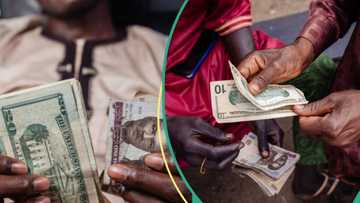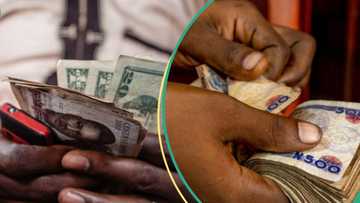CBN Says Nigerians Keeping N3 Trillion in Homes as Currency in Circulation Hits 92 Percent
- The Central Bank of Nigeria (CBN) has disclosed that currency outside the banks for November stood at N3 trillion
- The bank revealed that currency in circulation rose by 92% to hit N3.03 trillion
- A breakdown of the CBN data shows that currency outside the banks hit about 85% in the review period
PAY ATTENTION: The 2024 Business Leaders Awards Present Entrepreneurs that Change Nigeria for the Better. Check out their Stories!
Pascal Oparada has over a decade of experience covering Tech, Energy, Stocks, Investments, and Economy.
Data from the Central Bank of Nigeria (CBN) shows a rise in currency outside the banking system for November 2023, a record high since the naira redesign policy.
The bank’s Money and Credit Statistics show that the total currency in circulation for November amounted to N3.35 trillion, while currency outside the banking system is about N3.03 trillion, comprising 92% of the actual currency in circulation.

Source: Getty Images
CBN provides an analysis of currency in circulation
The record surpasses the previous N2.73 trillion in currency outside the banks, reported in September 2022, representing 85% of the N3.2 trillion in circulation.
The development prompted the CBN to enforce the naira redesign policy to curtail excess cash in circulation and currency outside the banks.
An analysis of the 11-month trend shows fluctuations in the currency in circulation and currency outside the banks.
In January last year, the currency in circulation was about N3.29 trillion. It declined in February to N982 billion, in March to N1.68 trillion, in April to N2.38 trillion, and in May to N2.53 trillion.
The amount spiked to N2.6 trillion in June, with a slight drop to N2.59 trillion in July. August saw an increase of N2.66 trillion. It rose further in September and October to N3.01 trillion and in November to N3.35 trillion.
ThisDay reports that currency outside banks for the review period ranged from N792 billion in January, with a marginal increase to N843 billion in February. It witnessed a reversal in March to N1.45 trillion and rose further in April to N2.07 trillion and N2.18 trillion in May.
For June, currency outside banks hit N2.26 trillion, July N2.21 trillion, and N2.22 trillion for August, and for September, it was N2.42 trillion, October N2.7 trillion, and N3.08 trillion for November.
The November figure marked the highest recorded currency levels in circulation and outside the banks.
Per the report, the percentage of money outside the banking system hit 92%.
Analysts believe CBN is fighting inflation
The development comes amid a report of cash crunch, which resurfaced in the same period that the CBN said Nigerians kept N3 trillion outside the banks.
Nigerians have battled sustained cash scarcity in the last three months, leading to bank agents, popularly called PoS operators, hiking their charges by 50%.

Read also
Naira appreciates by 5.8% at official market against US dollar as Tinubu’s govt secures support
Economist and banker Jude Chikere said the apex bank may be trying to check inflation by reining excess cash from the system.
“Despite the rise in inflation, CBN is still throwing in everything to reduce inflation in the system; I think that may be the reason for the current cash scarcity,” he said.
Currency in circulation hits all-time high
Legit.ng reported that data from the Central Bank of Nigeria shows that currency in circulation in Nigeria has increased to N2.299 trillion in October 2023, the highest since this year.
The amount represents 115.10% compared to the N1.39 trillion recorded in January this year and 8.33% higher than the N2.76 trillion in September.
In October last year, the apex bank withdrew the old N200, N500, and N1000 notes from circulation. It issued new designs, resulting in a temporary decline in currency in circulation as Nigerians exchanged their old naira notes for new ones.
PAY ATTENTION: Unlock the best of Legit.ng on Pinterest! Subscribe now and get your daily inspiration!
Source: Legit.ng



